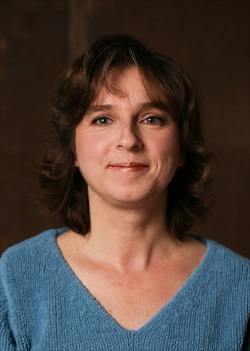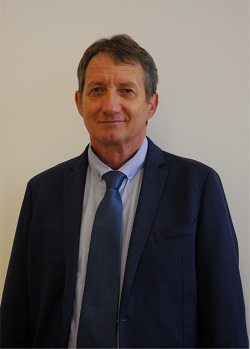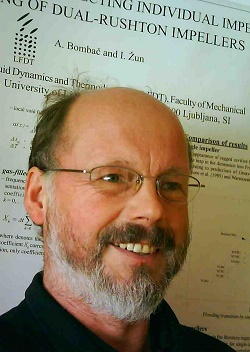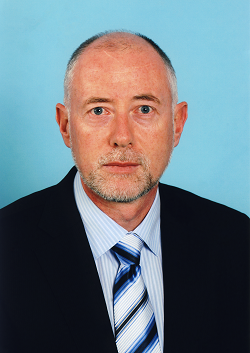STAFF
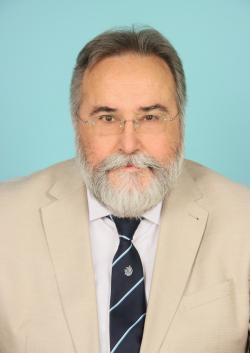
Prof. Božidar Šarler, PhD
Head of LFDT
📧 bozidar.sarler@fs.uni-lj.si
📖 Bibliography
Prof. Božidar Šarler, PhD
...
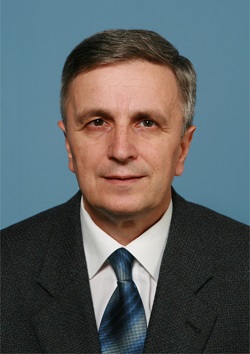
Assist. Anton Bergant, PhD
📧 anton.bergant@fs.uni-lj.si
📖 Bibliography
Assist. Anton Bergant, PhD
Anton Bergant, PhD has become involved in hydraulics as a junior fireman in his village. As professional engineer and researcher he has focused on hydraulics of water turbines and systems. He leads Applied Research and Calculations Department in Litostroj Power and he is a part-time employee with University of Ljubljana, Faculty of Mechanical Engineering. In Litostroj he has been a principal investigator of a number of research and industrial projects for customers in Slovenia and all over the world. He has served as a member of professional boards for solution of water hammer and flow-induced vibration problems. Dr. Bergant's main topic of research is transient cavitating pipe flow. Currently he collaborates with researchers from Australia, Canada, China, The Netherlands, Montenegro and Poland. He has been involved in design and construction of a number of experimental apparatuses (Adelaide, Delft, Podgorica) and development of software codes for hydraulic transients in systems. Recently he has developed a novel water hammer interferometer.
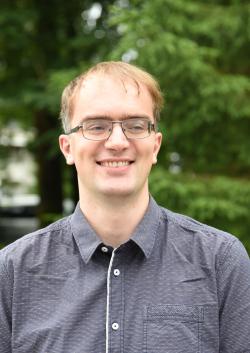
Assist. Prof. Boštjan Mavrič, PhD
📧 bostjan.mavric@fs.uni-lj.si
📖 Bibliography
Assist. Prof. Boštjan Mavrič, PhD
He completed the studies of physics at the Faculty of Mathematics and Physics, University of Ljubljana, in 2013 with master thesis in the field of computational physics on the topic of anomalous heat transfer in nano systems. He continued his research work as young resarcher at the Institute of metals and technology in Ljubljana at the Laboratory for simulation of materials and processes. He enroled in PhD programme at the University of Nova Gorica and graduated in 2017 in the field of material modelling with doctoral thesis in which he developed a meshless model of thermomechanics during DC casting of aluminium. After the graduation he joined the Faculty of Mechancial Engineering at Unviersity of Ljubljana as part time research assistant. His research work is focused on the development of meshless methods to model multiphase systems. Besides his work on the modelling of solid mechanics he also collaborated on the extension of the method to the models of solidification, turbulence, fluid flow, dendrite growth and two-phase flow. He also worked on integration of the developed models into simulation systems that are used by slovenian and foreign casting houses.
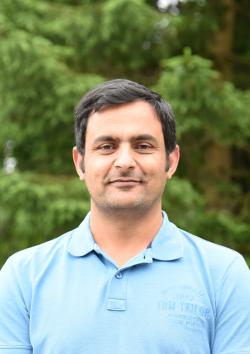
Assist. Prof. Rizwan Zahoor, PhD
📧 rizwan.zahoor@fs.uni-lj.si
📖 Bibliography
Assist. Prof. Rizwan Zahoor, PhD
Rizwan Zahoor was born in February 1986 in Pakistan, where he obtained his Bachelor of Mechanical Engineering degree in 2009 from the University of Engineering and Technology Lahore, the top most engineering institute in the country. After his degree, he worked for almost one year as a design engineer at Faruki Pulp Industries LTD and then moved to the United Kingdom, where he obtained his Masters of Mechanical Engineering from the University of Bradford. In 2012 he moved back to Pakistan, where he started working as a junior lecturer at Air University Islamabad and continued for almost 2 years. In 2014 he started his Ph.D. at the Graduate school at the University of Nova Gorica, under the supervision of Prof. Dr. Božidar Šarler. During his Ph.D. he worked and collaborated on various national and European projects, with Ph.D. research “Simulation of gas-focused liquid jets” mainly funded by Centre of Free Electron Laser (CFEL), Deutsches Elektronen-Synchrotron (DESY), Hamburg, under the project: Innovative methods for imaging with the use of X-ray free-electron laser (XFEL) and synchrotron sources: simulation of gas-focused micro-jets. Partial funding for the work was also provided by the Slovenian Research Agency under the project J2-7384: Advanced modeling of liquid-solid processes with free boundaries and program group P2-0162: Transient two-phase flows. During his Ph.D. and later until now he has published many articles in high impact factor journals, standing in the first and second quarters of their respective fields. Additionally, he has also published many conference papers and has held presentations on several international conferences. As he has worked and collaborated on many Slovenian and European projects, he has gained a very good knowledge of project implementations, while working independently and in a team. During the implementation of the projects with DESY Hamburg, he has also contributed to many project progress reports, which gave him a very good knowledge of project organization and management. He has gained comprehensive knowledge and experience in the fields of multiphase processes and numerical modeling during his study and work at the University of Nova Gorica and the University of Ljubljana. The researcher has extensive experience with the development and implementation of own source code in the Fortran programming language and other commercial and open-source codes. He received award for topmost publications in 2018 by Faculty of Mechanical Engineering for researcher under 35 years.
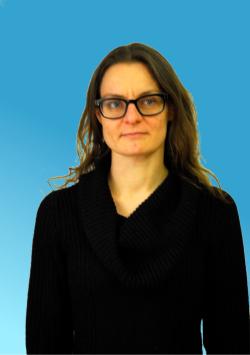
Res. Assoc. Katarina Mramor, PhD
📧 katarina.mramor@fs.uni-lj.si
📖 Bibliography
Res. Assist. Katarina Mramor, PhD
Katarina Mramor studied physics at the Faculty of Mathematics in Physics, University of Ljubljana. She graduated on 16th September 2010 with a degree in physics on the topic of artificial intelligence, where she used the artificial neural network for automation of photometric data processing in astronomy. After graduating, she was employed at the Center of Excellence for Biosensors, Instrumentation in Process Control, where she first worked in modeling of plasma cells for production of fullerenes, and then on modeling the magnetic field in the continuous casting process. At the same time, she enrolled at the University of Nova Gorica for a doctoral study in physics, which she successfully completed on 12 November 2014. As part of her PhD, she studied the influences of magnetic fields in the continuous casting of steel, and developed a meshless model for the needs of magneto-hydrodynamics. From 2014 to 2016, she was employed at the University of Nova Gorica, initially as an assistant, and after completing her doctorate as an assistant with a doctorate. During her work at the University of Nova Gorica, in cooperation with the DESY research center, she worked in two-phase flow models, and she continued her work on the magnetic fields in continuous casting of steel. From 1.2.2016 to 30.9.2017 she attended postdoctoral studies at the Jean Lamour Institute, University of Lorraine, where she worked in the solidification of metal alloys in vacuum remelting. After returning to Slovenia, she got a job at the Institute of Metals and Technology, where she continued to work on solidification, turbulence, fluid flow, and two-phase flows. Since November 2017, she has been working part-time at the Faculty of Mechanical Engineering, where she is employed full-time since July 2020.

Res. Assist. Qingguo Liu, PhD
📧 qingguo.liu@fs.uni-lj.si
📖 Bibliography
Res. Assist. Qingguo Liu, PhD
Qingguo Liu was born in May 1980 in Heilongjiang, China. In 2003 she graduated in Department of Mathematics of the Harbin Normal University and in 2010 she got the Master of Science in China. In 2014 she received her doctorate in physics from the University of Nova Gorica in the field of computer mechanics of solids. In her doctoral dissertation she focused on the development of meshless methods, non-singular method of fundamental solutions (NMFS), to problems arising in coupled solid mechanics. From 2014 to 2017, she worked at the University of Nova Gorica under the mentorship of prof. dr. Božidar Šarler. From 2017 to 2020, was employed at the Institute of Metallic Materials and Technologies as a postdoctoral researcher. In 2020, she obtained the title of research associate. During this time she was also partially employed in the Laboratory for Fluid Dynamics and Thermodynamics at the Faculty of Mechanical Engineering, University of Ljubljana as an assistant.
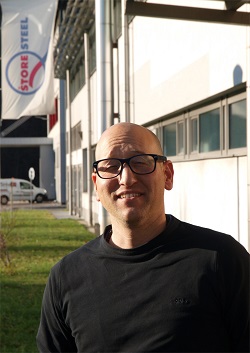
Res. Assoc. Miha Kovačič, PhD
📧 miha.kovacic@fs.uni-lj.si
📖 Bibliography
Res. Assoc. Miha Kovačič, PhD
Assoc. Prof. Miha Kovačič received his Ph.D. in Mechanical engineering at the Faculty of mechanical engineering, University of Maribor in 2004. In years 2000-2004 he was employed as young researcher at the Faculty of mechanical engineering, University of Maribor. From 2004 to 2011 he was employed as researcher in Research and development department in ŠTORE STEEL ltd steel plant, which is one of the biggest spring steel producers in Europe. Until 2016 he worked as quality manager and from 2016 he is the head of research and development department in the same steel plant. As a lecturer he has been involved in several classes at University of Nova Gorica, University of Novo mesto and at College of Industrial Engineering in Celje. With the original system of genetic programming and genetic algorithms he has successfully implemented modeling and optimization of technical systems, mostly in mechanical engineering and metallurgy, which led to significant improvements in production processes. He has published 60 original papers (41 SCI papers) in international scientific journals. His works were cited 428-times (without self-citations). At »Genetic Programming bibliography index page« he is ranked no. 16 out of 13056 authors.
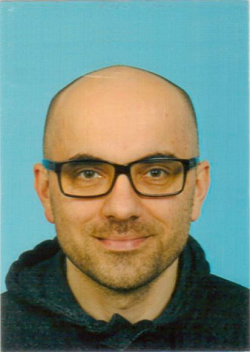
Res. Assoc. Robert Vertnik, PhD
📧 robert.vertnik@fs.uni-lj.si
📖 Bibliography
Res. Assoc. Robert Vertnik, PhD
Robert Vertnik has finished undergraduate studies of mechanical engineering in the Faculty of Mechanical Engineering, University of Ljubljana, with the thesis Influence of sprays on cooling intensity of heated steel plate. He continued his research work in the Laboratory for Multiphase Processes in University of Nova Gorica as a technical assistant. In 2003 he enrolled in master program Material characterization and successfully finished his study in 2007 with the title Local collocation method for phase-change problems. He continued research work in the same laboratory and enrolled PhD study, which he had successfully finished in 2010 with the title Heat and fluid flow simulation of the continuous casting of steel by a meshless method. In 2010 his PhD thesis was chosen for the best thesis in the field of computational methods in Central Europe by the ECCOMAS international organisation. From 2010 he has been employed as a researcher in Research and development department in Štore Steel d.o.o. And from the year 2019 as a PhD assistant in the Laboratory for Fluid Dynamics and Thermodynamics at the Faculty of Mechanical Engineering, University of Ljubljana. His primary field of scientific research work is the modelling and optimization of various processes in steel and aluminium industry. He is also involved in development of meshless methods for numerical modeling of the energy transport, fluid flow problems with turbulence, and convective-diffusive solid-liquid systems. He developed an on-line and off-line simulation system with graphical user interfaces for the continuous casting of steel in Štore Steel d.o.o. and graphical user interfaces for semi-continuous casting of aluminum alloys in Impol d.d.
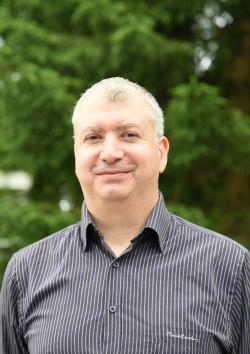
Assist. Umut Hanoglu, PhD
📧 umut.hanoglu@fs.uni-lj.si
📖 Bibliography
Assist. Umut Hanoglu, PhD
Umut Hanoglu was born in January 1983 in Ankara, Turkey. In 2006 he obtained his bachelor's degree in the field of mechatronic engineering from the Sabanci University in Istanbul. In 2015 he obtained his PhD from the University of Nova Gorica in the field of computational solid mechanics. His PhD work was focused on simulation of hot shape rolling of steel by a meshless method. His PhD work was later used as a basis to create an industrial application for rolling simulations at the Institute of Metals and Technology. The researcher has developed several computer codes for numerical simulations with user friendly interfaces in C# programming language. In 2009 he started working as a young researcher at the University of Nova Gorica, under the supervision of prof. dr. Božidar Šarler. After the graduation he started to work at the Institute of Metals and Technology as a post-PhD researcher. In 2018 he obtained the title Research associate. Meanwhile he has also started part-time working at the Laboratory for Fluid Dynamics and Thermodynamics, Faculty of Mechanical Engineering, University of Ljubljana as assistant.
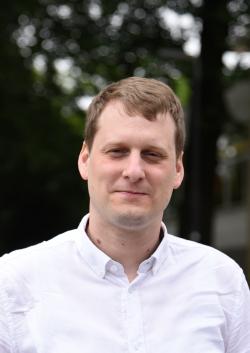
Assist. Tadej Dobravec, PhD
📧 tadej.dobravec@fs.uni-lj.si
📖 Bibliography
Assist. Tadej Dobravec, PhD
Tadej Dobravec enrolled in the Faculty of Mathematics and Physics at the University of Ljubljana after finishing high school at Gimnazija Želimlje. In 2012, he finished his I. cycle degree in Physics, programme Physics, and continued his study in II. cycle degree in Physics, the programme in Computational physics, which he completed in 2016. In the same year, he enrolled in Graduate school at the University of Nova Gorica in the III. cycle degree in Physics. In 2021, he finished his doctoral dissertation, »Numerical modelling of dendritic solidification based on the phase field formulation and adaptive meshless solution procedure«, under the supervision of Prof. Dr Božidar Šarler. In 2016, he started to work as an assistant at the Institute of Metals and Technology in the Laboratory for simulation of materials and processes. In 2020, he started to work as a researcher in the Faculty of Mechanical Engineering at the University of Ljubljana. He participated in the development of a meshless numerical model for the prediction of heat transfer in the framework of the simulation system for the continuous casting of steel and in the development of a meshless numerical model for the prediction of microstructure evolution on millimetre (point automata method) and micrometre (phase field method) scale in the framework of the simulation systems for continuous casting of steel and direct-chill casting of aluminium alloys. He participated in the following projects: Simulation of industrial processes of solidification under the influence of electromagnetic fields, Advanced modelling and simulation of liquid-solid processes with free boundaries, Materials and technologies for new applications, etc. From 2022 on, he is leading the postdoctoral project titled Advanced meshless modelling and simulation of microstructure evolution for the top-quality metal products.
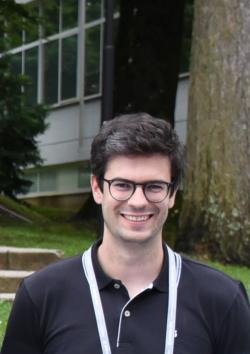
Assist. Gašper Vuga, PhD
📧 gasper.vuga@fs.uni-lj.si
📖 Bibliography
Assist. Gašper Vuga, PhD
Gašper Vuga began his studies at the Faculty of Mechanical Engineering in Ljubljana in 2013. He started working in the laboratory for fluid dynamics and thermodynamics as a student in the preparation of a diploma thesis entitled Simulation of the mechanical properties of castings with porosity based on meshless method. Later he was working in the laboratory on a master thesis entitled Development of a meshless numerical method for solving three-dimensional elasto-plastic problems. After completing his studies in September 2019, he started working as a Young Researcher in the same laboratory. His research work is focused on modeling elasto-plasticity, where he is using and at the same time developing a special type of a meshless numerical method called the local collocation method with radial basis functions. Developed numerical models are then applied to the physical processes of hot rolling of metals.
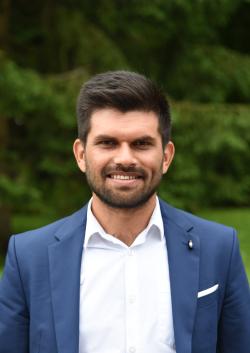
Res. Assist. Izaz Ali, PhD
📧 izaz.ali@fs.uni-lj.si
📖 Bibliography
Res. Assist. Izaz Ali, PhD
Izaz Ali did his bachelor’s degree in 2016 in the field of Mechanical Engineering from the University of Engineering and Technology Peshawar, Pakistan. After his BSc., he started working as a Management Trainee Engineer at the Bestway Cement Limited, Chakwal, Pakistan. In 2020 he completed his master’s degree in Mechanical Engineering Modelling from the Budapest University of Technology and Economics availing Stipendium Hungaricum Scholarship sponsored by the Tempus Public Foundation. In October 2020, he was selected for a PhD position and currently he is carrying out his duties as a Young Researcher on the title of “Numerical simulation of casting defects throughout the steel production path” at the laboratory for Fluid Dynamics and Thermodynamics, Faculty of Mechanical Engineering, University of Ljubljana since February 2021.
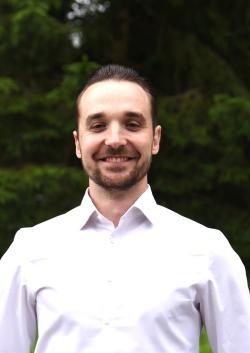
Assist. Krištof Kovačič
PhD student
📧 kristof.kovacic@fs.uni-lj.si
📖 Bibliography
Assist. Krištof Kovačič, PhD student
After graduating at the Gimnazija Bežigrad, Krištof Kovačič enrolled at the Faculty of Mechanical Engineering, University of Ljubljana, where he graduated in 2018. He continued his studies at the Faculty of Mechanical Engineering's Master's programme in the field of Thermal and Process Engineering. In the last year of the MSc course he showed his interest in numerical simulations of fluids, when he was a member of the student teams "Superior Engineering - Formula Student Team Ljubljana" and "DBF Edvard Rusjan Slovenian team," where he was in charge of numerical simulations in the field of aerodynamics. During his Master's studies, he was actively involved in research work on flow focusing in the Laboratory of Fluid Dynamics and Thermodynamics in collaboration with the Hamburg Research Centre Deutsches Elektronen-Synchrotron (DESY). In this field, in September 2022 he completed his MSc thesis entitled " Development and experimental validation of a 3D numerical model for prediction of gas-focused micro-jets characteristics " under the supervision of doc. dr. Jurij Gregorc and the co-mentorship of prof. dr. Božidar Šarler. In October 2022 he started working as a young researcher. He is currently working on the design and experimental validation of numerical models of gas-focused liquid-sheets.
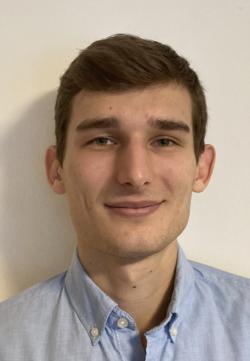
Assist. Bor Zupan
PhD student
📧 bor.zupan@fs.uni-lj.si
📖 Bibliography
Assist. Bor Zupan, PhD student
Bor Zupan enrolled in the Faculty of Mechanical Engineering in Ljubljana in 2017 where he graduated in September 2020 with thesis: Experimental evaluation of two-phase gas-liquid flow in an airlift reactor under the supervision of Assoc. Prof. Dr. Matjaž Perpar.
In his thesis, he dealt with emergent current regimes in airlift reactors and published the results in a conference paper, and was among the recipients of Krka's special commendation for his research work. In October of the same year, he enrolled in a master's degree at the Faculty of Mechanical Engineering,
the third semester of which he completed on an Erasmus+ exchange at the KU Leuven. In January 2023, he defended his master's thesis entitled: Experimental analysis of gas-focused micro-jets under the influence of an electric field under the supervision of Prof. Dr. Božidar Šarler. As part of his master's thesis,
he visited the German research center DESY, where he investigated micron jets under the influence of electric fields, which are used for sample delivery in serial femtosecond crystallography (SFX). He and his colleagues published the final results in an original scientific article and four conference papers.
At the beginning of 2019, he joined the Laboratory for Fluid Dynamics and Thermodynamics as a student researcher, where he worked until the end of his studies in January 2023. After completing his studies, he was employed at GEN-i d.o.o. from February to October 2023 at the Department of Advanced Analytics,
where he was involved in the development of a fundamental model for forecasting the movement of natural gas in Europe. Since October 2023, he has been employed as an assistant at the Department of Fluid Dynamics and Thermodynamics. In parallel, he enrolled in doctoral studies where he deals with experimental and numerical modeling of advanced delivery systems in SFX.
Assist. Gašper Vidic
PhD student
📧 gasper.vidic@fs.uni-lj.si
📖 Bibliography
Assist. Gašper Vidic, PhD student
...

Assist. Viktor Govže
PhD student
📧 viktor.govze@fs.uni-lj.si
📖 Bibliography
Assist. Viktor Govže, PhD student
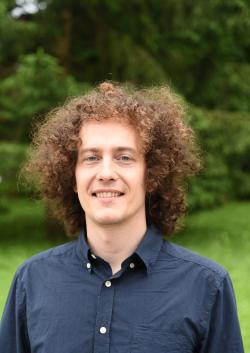
Matic Cotič
📧 matic.cotic@fs.uni-lj.si
📖 Bibliography
Matic Cotič
Matic Cotič enrolled in the Faculty of Mechanical Engineering, University of Ljubljana in 2008. After the study of LET – snovanje in vzdrževanje letal he did his seven month internship in Adria Tehnika company. He finished his First Cycle Studies in 2014 with thesis: Researching the Basic Characteristics of Mixing in a Model Fermenter with Multi-stage Impellers. Part of this research was presented in conference Kuhljevi dnevi, organised by Slovensko društvo za mehaniko. In the same year he enrolled in Second Cycle Study Programme at Fakulteta za strojništvo, with chosen direction Heat and Process Engineering. He continued working in laboratory LFDT as an independent professional worker, where he takes part in preparation and performing of some of the pedagogical work, covered by Chair of Fluid dynamics and Thermodynamics. He also participates at part of industrial projects and researches done in the LFDT.
